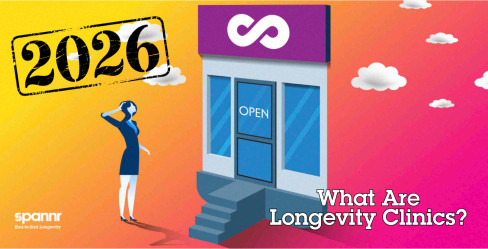What Is a Longevity Clinic? The Complete Guide to Healthspan Medicine

By Brent | Last Updated: January 22nd, 2026
What Is a Longevity Clinic? The Complete Guide to Healthspan Medicine
Key Takeaways
> Longevity clinics focus on preventive, proactive healthcare, not disease treatment alone.
> Services often include advanced diagnostics, biological age testing, and lifestyle interventions.
> Costs are high and typically not covered by insurance.
> Results vary and there is no magic anti-aging solution.
> These clinics are best suited for motivated, health-literate individuals with disposable income.
What Exactly Is a Longevity Clinic?
This could be an obvious answer to many of our readers. And sometimes it's not that cut and dry. Running a retention-focused marketing company serving the longevity niche, it's not as defined as you might think. In the simplest terms, the longevity clinic is a medical practice focused on optimizing long-term health and reducing the risk of age-related disease. Unlike traditional healthcare, which is largely reactive, longevity clinics emphasize early detection, prevention, and optimization.
These clinics aim to, and successfully do, extend healthspan, the years of life spent physically, mentally, and socially healthy. This approach reflects a broader shift toward proactive medicine rather than waiting for disease to emerge.
What Services Do Longevity Clinics Offer?
Longevity clinics typically provide services across three core categories:
> Advanced diagnostic testing
> Measurement of aging biomarkers
> Personalized lifestyle and medical interventions
Common Diagnostic Services
Longevity clinics use diagnostics to identify early signs of disease and functional decline. These may include:
> Whole-body MRI scans
> Electrocardiograms (ECG)
> Blood pressure and BMI assessments
> Cognitive performance testing
> Grip strength and mobility testing
Biomarkers of Aging
Tracking aging biomarkers allows clinics to monitor biological aging and intervention effectiveness. Common markers include:
> Blood-based biomarkers: metabolic, inflammatory, and cardiovascular markers
> DNA methylation: epigenetic clocks estimating biological age and aging rate
> Cognitive markers: non-invasive tests of neurological function
> Physical performance metrics: strength, endurance, and functional capacity
Clinics often compare patient results to an “optimal” reference range, typically modeled after healthy individuals aged 20–30.
Services Table: What You’re Actually Paying For
|
Service |
What It Is |
Typical Cost Range |
|
Comprehensive Blood Panel |
50–100+ biomarkers tested |
$500–$2,000 |
|
Biological Age Testing |
Epigenetic clock analysis |
$300–$500 |
|
IV Therapy |
NAD+, vitamins, hydration |
$200–$1,000/session |
|
Hormone Optimization |
TRT, HRT, thyroid |
$200–$500/month |
|
Executive Physical |
Full-day comprehensive exam |
$2,000–$10,000 |
How Much Does a Longevity Clinic Cost?
Longevity clinics are expensive by design. Costs vary based on location, physician expertise, and diagnostic depth.
Typical pricing examples:
> Basic health assessments: $500–$2,000
> Hormone replacement therapy: $300–$1,000/month
> Stem cell therapies: $5,000–$20,000+ per session
> Personalized longevity programs: $10,000+ annually
> Luxury longevity retreats: $50,000+
This model is not accessible or necessary for everyone.
Who Should Consider a Longevity Clinic?
Longevity clinics may be appropriate for:
> High-net-worth individuals seeking proactive health optimization
> Executives prioritizing performance, cognition, and long-term health
> People with strong family histories of age-related disease
> Individuals already committed to lifestyle optimization
Who This Is Not For
> Those looking for quick fixes or guaranteed outcomes
> Anyone expecting insurance coverage
> Individuals uncomfortable with experimental or emerging therapies
> People unwilling to change diet, exercise, or sleep habits
The Top Longevity Clinics in the US (2026)
Several clinics have emerged as leaders in preventive and longevity-focused care:
> Human Longevity Inc.
Focuses on genomics, advanced imaging, and early disease detection.
> Fountain Life
Offers precision diagnostics for cancer, heart disease, and dementia.
> Prenuvo
Known for whole-body MRI scans aimed at early cancer detection.
These clinics emphasize early risk identification rather than symptom treatment.
What to Expect at Your First Appointment
Most first visits include:
> Extensive health history intake
> Blood draws and diagnostic testing
> Body composition and performance assessments
> Review of lifestyle, sleep, and stress factors
Results are typically reviewed in a follow-up session with a physician, who may recommend lifestyle changes, supplements, or medical therapies.
Red Flags: How to Spot a Bad Longevity Clinic
Be cautious if a clinic:
> Promises guaranteed lifespan extension
> Pushes expensive therapies without diagnostics
> Avoids discussing risks or limitations
> Operates without licensed physicians
> Uses vague or proprietary metrics without explanation
Skepticism is healthy in an evolving field.
Longevity Clinics vs. Concierge Medicine: What’s the Difference?
Concierge medicine focuses on access and convenience. Longevity clinics focus on biological optimization and prevention.
Longevity clinics typically offer deeper diagnostics, aging biomarkers, and experimental protocols, while concierge practices emphasize traditional care with better availability. The two complement each other well, as most Longevity Clinics do not act as your PCP, so you’d want to find a primary care physician, and concierge is a great way to go.
Frequently Asked Questions
What is a longevity clinic?
A longevity clinic is a medical practice focused on preventing age-related disease and optimizing long-term health through advanced diagnostics and personalized interventions.
How much does it cost to go to a longevity clinic?
Costs range from a few hundred dollars for testing to tens of thousands annually for comprehensive programs.
Are longevity clinics covered by insurance?
No. Most services are considered elective and are paid out of pocket.
What tests do longevity clinics run?
Blood panels, biological age tests, imaging scans, cognitive testing, and physical performance assessments.
How do I find a reputable longevity clinic near me?
Look for licensed physicians, transparent pricing, evidence-based protocols, and realistic claims.
What is the difference between a longevity clinic and a regular doctor?
Longevity clinics focus on prevention and optimization, while traditional doctors focus on diagnosing and treating disease.
Are longevity clinics worth the money?
For some people, yes. For others, similar benefits can be achieved through lifestyle changes without clinic-level intervention.
Final Perspective
Longevity clinics represent a shift toward proactive, data-driven healthcare. While the science is evolving and results vary, these clinics offer motivated individuals access to advanced diagnostics and personalized strategies to improve long-term health.
They are not magic, not cheap, and not necessary for everyone. But for the right person, they can serve as a structured framework for taking healthspan seriously.
About the Author
Sign Up For Our Newsletter
Weekly insights into the future of longevity
